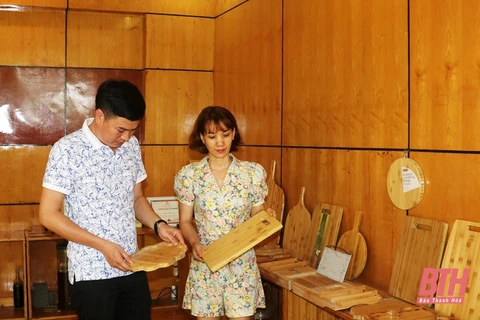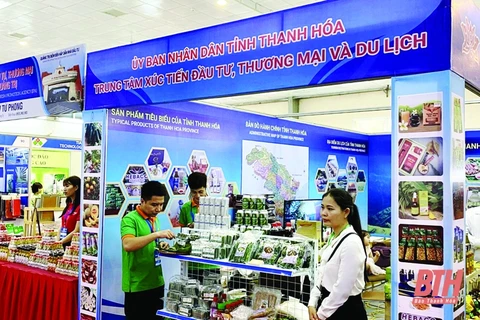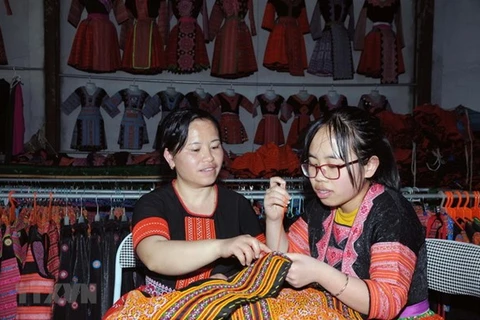Thanh Hoa (VNA) – The central province of Thanh Hoa, home to a large number of tangible and intangible heritage including various traditional festivals, is rolling out practical measures to combine tourism development with the preservation and promotion of the heritages' values.
Over the years, together with efforts in boosting socio-economic development, the province has given great attention to the promotion of cultural values.
The restoration and preservation of traditional festivals, folk games, songs and dances have been carried out effectively with positive outcomes. Many festivals have become common cultural practices of local residents.
At the same time, many festivals and folk games of local ethnic minority groups such as Thai and Muong have been revived.
However, the effectiveness of the exploitation of the heritage to make them an important resource for the locality’s development has yet to meet Thanh Hoa’s expectations.
In this context, Thanh Hoa has focused on choosing, investing in and promoting a number of typical traditional festival and unique folk cultural practices with the aim to turn them into its special tourism products, under a project approved recently by the provincial People’s Committee, to serve tourism development.
The province has chosen three festivals at provincial level and five at district level for promotion, aiming to form and supplement Thanh Hoa tourism products and trademark.
The three provincial-level festivals selected for the purpose are Lam Kinh, Ba Trieu and Le Hoan festivals, while the five festivals at district levels are “Mau Tam phu” (Tam Phu Mother Goddess) Festival, Am Tien-Phu Nua Festivals, Dong Co Temple Festival, Mai An Tiem Festival, and Cau Ngu (whale worship) Festival of coastal localities.
Among the provincial-level festival is Le Hoan Festival, which is held annually on the 7th, 8th and 9th day of the third lunar month at Le Hoan historical relic site and temple in Xuan Lap commune of Tho Xuan district to commemorate Le Hoan, posthumous name Dai Hanh Hoang De (Emperor Dai Hanh), who was born in 941 in Trung Lap village in the area which is now Xuan Lap commune.
He founded the Early Le Dynasty and continued the unfinished national construction process of King Dinh Bo Linh, also known by his posthumous name Dinh Tien Hoang, so as to build a strong Dai Co Viet – the first centralised feudal state of Vietnam – in the 10th century.
During the 24 years under Le Hoan’s reign, the country was in peace while people enjoyed a happy life thanks to unprecedented reforms.
To pay tribute to Le Hoan, local residents built a temple in his hometown in Trung Lap village of Xuan Lap commune.
Meanwhile, Cau Ngu Festival is held in the second lunar month each year in Hau Loc district, Nghi Son town and Sam Son city.
At the same time, the province will also restore and promote six unique folk cultural practices to perform in tourist sites to serve visitors.
Furthermore, six new festivals will be organised, with the expectation that they will become major tourist destinations – Phu Trinh Temple Festival, Lang Mieu Trieu Tuong (Trieu Tuong Tomb) Festival, Trong Mai love festival, Ho Citadel Heritage Festival, Dan Te Nam Giao (Nam Giao altar) Festival, and Huong sac vung cao (mountainous beauty) Festival.
However, experts held that in order to implement the scheme in an effective manner, it is necessary for Thanh Hoa to design suitable mechanisms and policies, especially those in developing infrastructure system in tourist sites and festival sites to ensure best services for visitors. At the same time, suitable management mechanisms should be made for particular festivals as well as the connection of tourism routes in the provinces and in the whole regions.
Alongside, Thanh Hoa should work harder to promote the role of folk artisans in transferring their knowledge in traditional culture to younger generations, while developing human resources for festival tourism activities, and calling for the engagement of the community in the implementation of the scheme./.
VNA

























